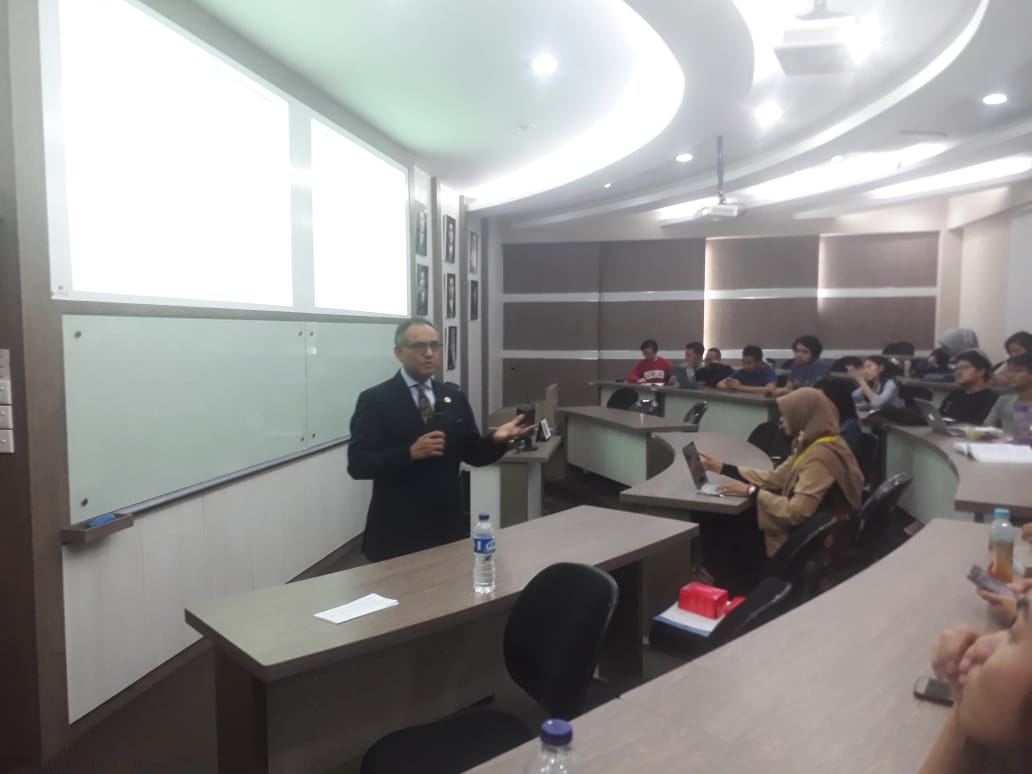GUEST LECTURE FROM MICHIGAN STATE UNIVERSITY: DIGITAL ECONOMY AND INDUSTRY 4.0
DEPOK – On Friday (22/11/2019), FEB UI Department of Accounting held a guest lecture entitled “Digital Economy and Industry 4.0”. The guest lecture was delivered by Prof. Sanjay Gupta, PhD, LL.B, CPA, Dean of Eli Broad College of Business, Michigan State University, USA. His research on the political economy of corporate taxation and state corporate tax issues has been cited in the media, court cases, and at public policy forums and ranks in the top two per cent of all authors in the Social Science Research Network (SSRN). The guest lecture took place from 10.00am until 11.30am in ISTAMA room of Department of Accounting, Faculty of Economics and Business, Universitas Indonesia.
The lecture was opened with welcoming remarks from the Director of Department of Accounting, Dr Ancella Anitawati Hermawan, MBA, CA, ACMA, CGMA. Before the lecture started, Prof. Gupta explained a little bit about his college, the Eli Broad College of Business. In the lecture, Prof. Gupta outlined what is Industry 4.0 and its implications, how international world responses to such changes, the future of work and jobs, and the examples of responses from Eli Broad College.
The Fourth Industrial Revolution, as Prof. Gupta defined, is a change from the fusion of technology that blurring the lines between physical, digital, and biological spheres. The ‘revolution’ fundamentally change the way humans live, work, play and relate to each other. Prof. Gupta explained, one of the implications of the fourth revolution is computer intelligence that would probably surpass human intelligence by 2029. It would also create what would be called Big Bang Disruption, in which the cost of creation, information and experimentation would be the declining; market penetration would occur in short blast and thus leading every business to become a digital business. Almost of all of the private and public unicorn now are tech-driven.
Prof. Gupta explained International responses for the Industry 4.0 Revolution are mainly creating initiatives and platform to prepare for the changes. In Indonesia, a goal for being Worlds Top 10 Economies ns a response for the 4.0 Industry Revolution. The goals are expected to be accomplished by 2030 and include; Double the productivity-to-cost ratios, Increase net export values to 10% of GDP, Increase R&D spending to 2% of GDP and create 7 million new jobs.
Prof. Gupta argued that the future of work will change as more and more jobs would be automated. The changes can be summarized as VUCA (Volatility, Uncertainty, Complexity and Ambiguity). Traditional educational content, systems, pedagogy must transform to meet the needs of the new normal. He reiterates the skill priorities from World Economic Forum in which the cognitive skills (such as creativity and mathematical reasoning) and process skills (such as active listening and critical thinking) are more important than content skills. However, Prof. Gupta also highlighted the importance of ethics.
Lastly, Prof. Sanjay Gupta also cited much-needed examples from Broad College response for the Industry Revolution, such as requiring a 3-course sequence of computing competencies, big data, and quantitative research methods for all undergraduate student. for MBA program, elective courses are offered to emphasize New Economy topics.
The guest lecture ended with a Q&A session and token appreciation exchange. We very much thanks to Prof. Sanjay Gupta for shedding lights on the needs to prepare for the 40 Industrial Revolution. The knowledge given would hopefully be the guidance for policymakers and education sector alike to adapt for these new changes. (IOFEB/NS)

